A Tapestry of Heritage and Modernity Nestled in the southern state of Tamil Nadu, Vellore City stands as a testament to the harmonious blend of tradition and progress. Boasting a rich historical legacy dating back to the Pallava, Chola, Nayak, Maratha, and British colonial periods, the city exudes an aura of antiquity while embracing contemporary advancements. Here's a glimpse into the captivating attractions that make Vellore a must-visit destination:
The iconic Vellore Fort, built during the 16th century by the Vijayanagara Empire, is a crowning jewel of the city. Its formidable ramparts, intricate carvings, and architectural grandeur narrate tales of valor and resilience. Within its walls lie the Jalakandeswarar Temple, renowned for its Dravidian architecture, and the mesmerizing St. John's Church, a poignant symbol of colonial-era craftsmanship.
The Vellore Fort which is said to have been built during Channa Bommi Nayaka and Thimma Reddy Nayaka in the 15th century and happens to be one of the best examples of military architecture in South India. These two who built Vellore fort were Chieftains under Sadashiva Raya who was the ruler of Vijayanagara at that time. It is one of the most massive forts built during its time and is considered as one of the unique forts in India. It is spread over an area of more than 500 meters, situated at an altitude of 220m. Located right in the centre of the city, it has a giant moat at its entrance, where 10,000 crocodiles used to swim earlier.
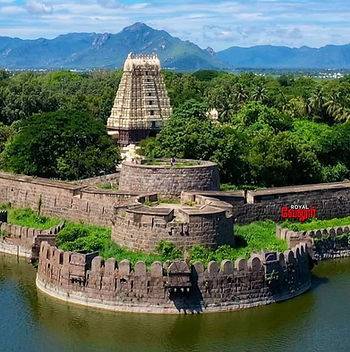
The Sripuram Golden Temple is a sight to behold, and it is situated in Tirumalaikodi at Southern Vellore, Tamil Nadu. The golden temple sits inside a spiritual park or 'Spiritual Oasis', and a star path leads the visitors towards it. The main feature of the temple has to be that it is covered in real gold foil and it is regarded as the biggest and the only temple to do that. The inauguration took place on 24th August 2007, and it was inaugurated by Narayani Amma.
The chief deity of the temple is Sri Lakshmi Narayani or Maha Lakshmi, who is the Goddess of wealth in Hinduism. Sahasra Deepam or one thousand eight lamps is a ceremony that is performed in the temple every morning and in the evening. Pilgrims enjoy the beautiful natural park when they visit the temple. The best time to visit the temple is every day as the body decided to keep it open 365 days in a year.
A spiritual oasis nestled amidst lush greenery, the Golden Temple is a divine marvel dedicated to Goddess Mahalakshmi. Adorned with intricately carved gold foils, the temple complex radiates serenity and opulence, attracting devotees and tourists alike from across the globe.
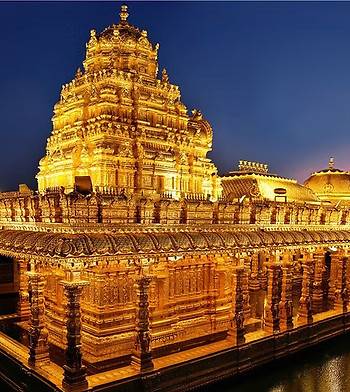
Yelagiri Hills in Vellore, Tamil Nadu!, nestled amidst serene landscapes and gentle slopes, Yelagiri Hills offers a tranquil escape from the hustle and bustle of city life. Whether you're an adventure enthusiast, nature lover, or simply seeking a peaceful retreat, this quaint hill station has something to offer for everyone.
A quaint little hill station located in Vellore, Yelagiri is just three hours away from Bangalore, making it the perfect spot for a quick weekend getaway. Spread a little over 30 square kilometres, and at a height of over 1100 metres above sea level, Yelagiri offers its tourists some beautiful places like the Jalagamparai falls, sweeping orchards and rose garden, among others.
The ideal destination for nature lovers, Yelagiri is a town that is completely off the beaten tourist trail, lending it a quieter and much more peaceful vibe compared to other more famous hill stations nearby. Originally belonging to the Zamindar family of Yelagiri, the hill station began to gain popularity since the colonial rule, when it was used by the British as a summer getaway.
Explore the scenic viewpoints, indulge in thrilling activities like paragliding and trekking, or simply unwind amidst the lush greenery. Don't miss the picturesque Punganur Lake and the tranquil Jalagamparai Falls, both perfect spots to rejuvenate your senses.
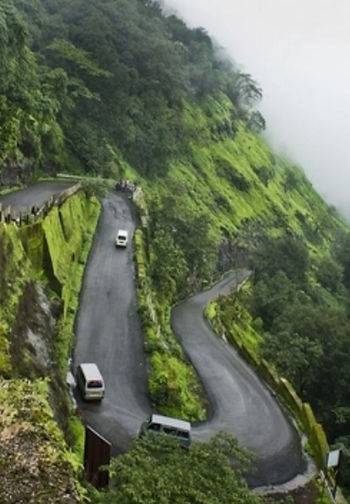
Nature enthusiasts and wildlife aficionados can revel in the verdant expanse of the Amirthi Zoological Park. Sprawling across lush forests and cascading waterfalls, the park is home to a diverse array of flora and fauna, offering a tranquil retreat amidst the lap of nature.
Amirthi Zoological Park, situated near Vellore in Tamil Nadu, is a charming wildlife sanctuary that offers a serene escape into nature while providing an opportunity to observe diverse animal species in their semi-natural habitats. The park, spanning over 25 square kilometers, is a blend of lush greenery, rolling hills, and an array of wildlife, making it a popular destination for those seeking to connect with nature and explore wildlife in a tranquil setting.
Location: The park is located about 30 kilometers from Vellore, nestled in the picturesque Amirthi Valley. Its proximity to the Nilgiri Hills adds to its scenic beauty and makes it an accessible yet tranquil retreat from the city.
Wildlife: Amirthi Zoological Park is home to a variety of animals, including tigers, lions, leopards, deer, and a diverse range of bird species. The park focuses on conservation and education, providing a habitat that mimics the natural environments of its inhabitants.
Amirthi Waterfalls: A highlight of the park is the Amirthi Waterfalls, which is a popular spot for visitors to relax and enjoy the natural beauty. The falls provide a refreshing break and a chance to enjoy the park's tranquil ambiance.

St. John's Church is one of the oldest churches in the Vellore Diocese which follows the Anglican tradition. Located in the heart of the city in Vellore and within the campus of Vellore Fort, it is a church that is most visited by the locals and also one of religious significance. Built-in 1846, the interiors of the church has a touch of charm to it.
This beautiful church is located at a distance of about 1.5 kms from the Vellore Railway station, which is situated in the fort of Vellore. The St. John's Church is said to have begun in 1846, by Reform Church of America, goes by the name, RCA. The church was relocated from FilterBed Road to its at-times location. It is said that the Soldiers who lost their lives amid the war of Sepoy Mutiny have been buried in the establishment of the Church.
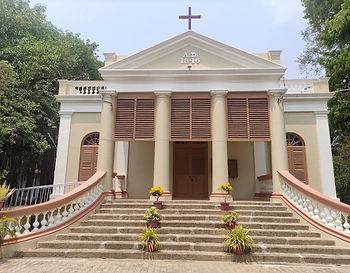
The Government Museum in Vellore is a valuable institution that offers a rich tapestry of the region's historical and cultural heritage. With its diverse collections, educational programs, and commitment to preservation, the museum serves as a key resource for understanding the historical significance of Vellore and Tamil Nadu.
Established in 1980, the museum is located in the heart of Vellore, near the Vellore Fort on Gandhi Road. The museum houses an impressive collection of archaeological finds, including ancient coins, pottery, and sculptures that date back to various historical periods, as well as natural history exhibits and ethnological displays.
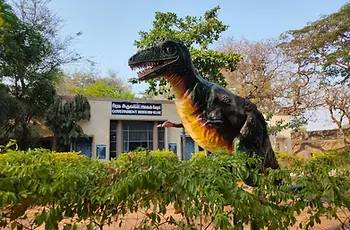
The Science Park in Vellore is a valuable educational resource that offers an interactive and engaging environment for learning about science and technology. With its diverse exhibits, educational programs, and hands-on experiences, the park serves as an important hub for fostering scientific curiosity and innovation.

In essence, Vellore City is a kaleidoscope of heritage, spirituality, and modernity, offering a captivating tapestry of experiences for every traveler. Whether you're a history buff, a nature lover, or a connoisseur of culture, Vellore beckons with open arms, ready to enchant and inspire.